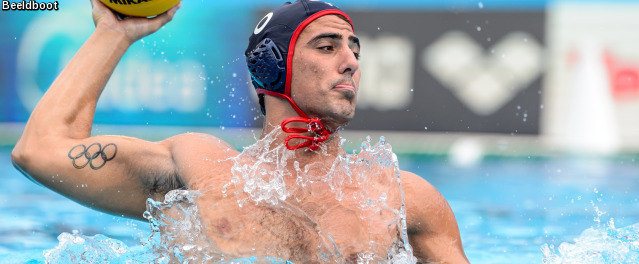Members of the South African women’s and men’s national water polo team have been told by the South African Sports Confederation and Olympic Committee (SASCOC) that they will be responsible for fronting the costs associated with going to the 2020 Olympic Games. An estimate for how much each athlete will be required to pay is reported to be up to 100,000 South African rands, equal to roughly $6,679 USD.
The decision to require athletes to self-fund for the Games can be read under Point 2 of South Africa’s selection criteria for their water polo team for the upcoming Olympic Games.
According to a source from within the South African water polo community, the news has proven to be a significant barrier to many players’ Olympic dreams despite years of fundraising for the team’s expenses.
As the majority of athletes’ expenses are covered once they arrive in the Olympic Village, some are questioning what the athlete-provided funds will cover. One early theory from the aforementioned source is that the costs will cover the travel and lodging expenses of officials who will be traveling with the teams but who won’t be staying in the Olympic Village.
Despite this announcement, Swimming South Africa (SSA) has not yet named the final roster for water polo at the Games this summer. The country is again already selected for the Olympic Games as the continental representation.
South Africa recently competed at the 2019 World Aquatics Championships, finishing 12th out of 16 teams in the water polo tournament.
South Africa’s men’s water polo team last competed at the Olympic Games in 1960, where they placed 9th. The country’s only other appearance came in 1952, where they placed 14th.
This is the latest in funding issues within Swimming South Africa, with the country’s athletes in the past relying on donations from Princess Charlene of Monaco, a former South African Olympic swimmer, to fund their travel to major meets.
The news that South African athletes will be required to self-fund for their Olympic appearance comes following years of controversy within the SASCOC and SSA. Back in 2017, an official inquiry into “alleged irregularities or malpractices in the governance and management of the South African Sports Confederation and Olympic Committee” was ordered by South African Minister of Sport and Recreation, Thulas Nxesi.
According to a 2018 report from Play the Game, the inquiry was ordered to investigate a wide variety of offenses including financial mismanagement, constitutional breaches, sexual harassment, malpractice, and racism.
One of the major fallouts from the report was the dismissal of SASCOC CEO Teddy Rubby in January 2018.
Later in 2018, the SASCOC came under fire once again for poor athlete management at the U-20 Youth Games in Botswana. It was reported that the South African women’s swimming contingent at the Games were left to sleep on the floor with no pillows and were provided the ability to shower. At the time, those calling out the SASCOC contrasted the harsh conditions with salaries that had been reported for board members, the CEO, GM, and COO:
For 2nd straight night, SA female swim team members at U-20 Youth Games in Botswana had to sleep on a floor with no pillows & no showers. #SASCOC & @SwimSouthAfrica should be ashamed! No funds? But SASCOC board members continue to get salaries in contravention of IOC charter! pic.twitter.com/M47h7BuHd5
— Graeme Joffe (@Joffersmyboy) December 6, 2018
Amid the controversy within the South African sporting community, Swimming South Africa announced the formation of a new 8-member Athletes Committee to voice concern on behalf of athletes to the SSA governing body. Members of that committee at the time included Penny Heyns (AC Chair), Laura Strugnell (Artistic Swimming), Cameron van der Burgh (Swimming), Tatjana Schoenmaker (Swimming), Kelsey White (Water Polo), Lwazi Madi (Water Polo), Alani Ferreira (Disability Swimming), Karen Kennedy (Masters), Chad Ho (Open Water), Stefan Steenkamp (Diving).
As Tokyo 2020 approaches, we hope to get a better sense of exactly how much each athlete will be required to pay for their journey to the Games as well as an understanding of what costs those funds will cover.

Please can I get the contact details of the author of this article? I would like to help the SA Olympic teams raise funding.
South Africa did not compete in the water polo competition in Rio
Can the IOC step in and help in this situation ? Don’t they have millions of corporate dollars from hosting Olympics and yet athletes have to self fund .. where’s all the billions of Olympic dollars going to ?
The IOC doesn’t have enough money to fund travel for every country on earth. So then the question becomes, which countries does the IOC bail out, and which ones do they not?
I would suspect that the ones they bail out would not begin with last place teams representing Olympic Committees that have been accused of abuse cover up and financial mismanagement in the last quad.
Maybe 15 years ago, but not now. There’s too much scrutiny now.
Adding rugby to the Olympics should have been a financial boondoggle for the SASOC. I would much prefer the IOC use its weight to teach the SASOC how to better manage its house and capitalize on the Olympic movement at home.
I agree exactly not a bailout .. IOC should use their powers and connections to step in and ensure that athletes or teams that qualify for the Olympics are not missing out due to mismanagement or corruption present at national Olympic level ..
All too familiar isn’t it?